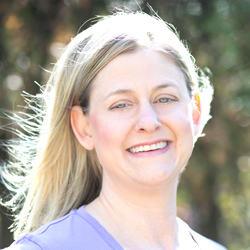The information you will be accessing is provided by another organization or vendor. If you do not intend to leave our site, close this message.
D-SNP home page > Health tips & tools > Could you have sleep apnea and not know it?
Could you have sleep apnea and not know it?
Older adults are at high risk for this sleep-stealing condition, but it often goes undiagnosed. Here’s what it could mean for your health and what to look for.
 By Hallie Levine
By Hallie Levine

Older adults are no strangers to sleep troubles. Up to 70 percent of them have chronic sleep issues.1 And yet sleep apnea — the second-most common sleep disorder in the U.S. — often goes undiagnosed in people over age 65.
In fact, one study found that more than half of people 65 and older were at high risk for obstructive sleep apnea. Yet only 8 percent of them had been tested. And of those who were tested, a whopping 94 percent were diagnosed with apnea.2 Why are there so many missed diagnoses?
“Older people frequently have other health issues that may make sleep apnea harder to diagnose,” says Meir Kryger, M.D. He’s a professor at the Yale School of Medicine in New Haven, Connecticut. “If you’re an overweight 54-year-old male who snores, it’s a piece of cake to diagnose. You can do that with a home sleep test,” Dr. Kryger says. “But it can be harder to tease out in people over the age of 65 who may have other medical problems. If a patient complains to their doctor that they’re very sleepy, their provider often mistakenly assumes it’s a sign of depression, without taking the time to do a proper history to figure out what else is causing that person’s sleepiness.”
It’s important that people with sleep apnea get diagnosed and treated. Untreated sleep apnea has been linked to serious health concerns, including:3
- High blood pressure
- Type 2 diabetes
- Stroke
- Heart attack
A recent study also found that people living with sleep apnea were more than twice as likely to experience sudden death as those without sleep apnea.4 So if you suspect you have sleep apnea, it’s critical that you understand it and take steps to treat it. Here’s what you need to know.
What exactly is sleep apnea?
Sleep apnea is a condition in which breathing during sleep repeatedly stops and starts. There are two main types:
1. Obstructive sleep apnea (OSA). This is the most common type. It happens when throat muscles relax, which causes your throat to narrow. As a result, you have trouble breathing and you wake up. (Though you usually don’t awaken completely.) Risk factors include:
- Being overweight
- Being male
- Having a family history of OSA
- Using alcohol or sedatives
- Smoking
2. Central sleep apnea. In this form of apnea, your brain doesn’t send the right signals to the muscles that control your breathing. It can result from other health conditions, such as heart failure or stroke. Or it may be caused by taking medications that can affect breathing, such as opioids.
The subtle signs of sleep apnea
The major symptoms of sleep apnea are snoring, fatigue and feeling sleepy during the day. But you can still have sleep apnea without these symptoms. More subtle signs to look for include:
- Uncontrolled high blood pressure. Up to half of all people with hypertension also have sleep apnea, according to the American College of Cardiology.5 “A red flag is what we call resistant hypertension, which means that you can’t get your blood pressure under control despite being on at least two high blood pressure medications,” says Dr. Kryger. The good news: Blood pressure usually improves once these patients get their sleep apnea diagnosed and treated with a CPAP machine.
- Morning headache. About 30 percent of people with sleep apnea notice a headache when they wake up in the morning.6 It generally goes away on its own within a few hours of waking up.
- Impotence. Some studies suggest that as many as half of all men with sleep apnea also have erectile dysfunction (ED).7 “Men with sleep apnea may have lower testosterone levels, which may be associated with a loss of interest in sex. Or they may have other medical conditions like high blood pressure or atrial fibrillation,” says Dr. Kryger. Both can cause ED.
- Sleep problems. If you have sleep apnea, you may notice that you wake frequently throughout the night. This may lead you to think you have insomnia when you really don’t, says Dr. Kryger. In fact, if your doctor prescribes sleeping pills to treat it, that can actually make the apnea worse, he says.
- Dry mouth. This may happen simply because your apnea forces you to breathe through your mouth, which dries it out, says Dr. Kryger.
How to overcome sleep apnea
If you notice any of the above signs, Dr. Kryger suggests asking your doctor for a referral to a sleep specialist. They can screen you for the condition and recommend treatments. The gold standard treatment for sleep apnea is a CPAP machine. It increases air pressure in your throat so that your airway doesn’t collapse when you breathe in. You can choose from multiple types of machines and masks to help you find a comfortable option.
The following lifestyle changes may also help:
- Switch up your sleep position. If possible, try to avoid sleeping on your back.
- Lose weight if you’re overweight or have obesity.
- Avoid alcohol and sleeping pills. It’s important to drink very little alcohol, even during the daytime.
Finally, remember that taking the first step — identifying the problem — is key. It can help improve your sleep and quality of life for years to come.
1Miner B and Kryger MH. Sleep in the aging population. Sleep Medicine Clinics. March 2017; 12(1): 31-38.
2Braley TJ, Dunietz GL, Chervin RD, et l. Recognition and diagnosis of obstructive sleep apnea in older Americans. Journal of the American Geriatrics Society. May 9, 2018; 66(7): 1296-1302.
3Johns Hopkins Medicine. The dangers of uncontrolled sleep apnea. Accessed June 13, 2022.
4Heilbrunn ES, Ssentongo P, Chinchilli VM, et al. Sudden death in individuals with obstructive sleep apnoea: a systematic review and meta-analysis. BMJ Open Respiratory Research. June 9, 2021; 8(1): e000656.
5American College of Cardiology. Sleep apnea and high blood pressure a dangerous pair. May 1, 2015. Accessed June 13, 2022.
6Spalka J, Kedzia K Kuczynski W, et al. Morning headache as an obstructive sleep apnea-related symptom among sleep clinic patients — a cross-section analysis. Brain Sciences. January 2020; 10(1): 57.
7Pascual M, de Batlle J, Barbe F, et al. Erectile dysfunction in obstructive sleep apnea patients: a randomized trial on the effects of continuous positive airway pressure (CPAP). PLoS One. August 2018; 13(8): e0201930.



